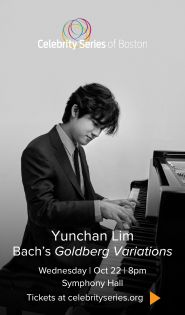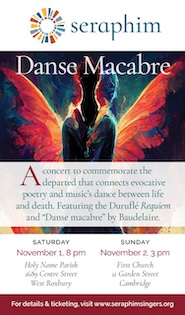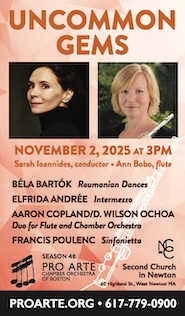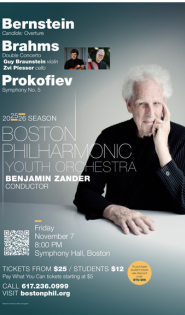Pichon makes worthy H&H debut leading Bach Christmas program
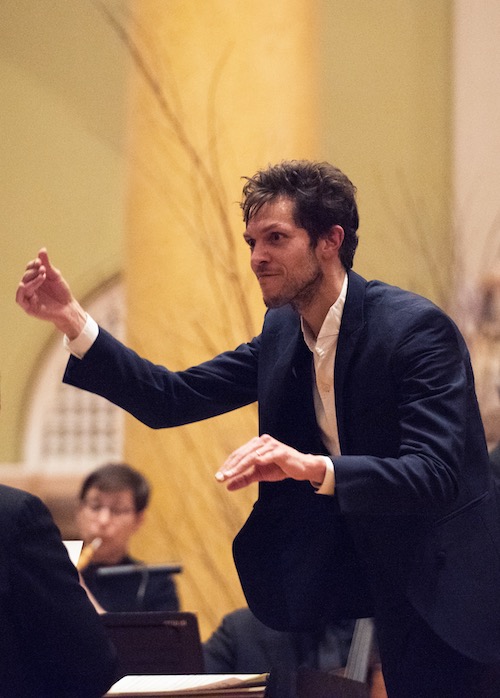
Raphaël Pichon conducted the Handel and Haydn Society Friday night at St. Cecilia Parish. Photo: Sam Brewer
Holiday concerts in and around Boston are as rich and varied as the season’s festivities. But for the Handel and Haydn Society, the holidays offer the chance to explore music as familiar as any favorite carol or hymn. The company’s annual “Bach Christmas,” conducted by Raphaël Pichon in his H&H debut, welcomed the season with exuberance Friday night at St. Cecilia Parish.
The music of Bach has long been a specialty for Pichon. The French conductor has led the composer’s motets and shorter masses with Ensemble Pygmalion, resulting in recordings noteworthy for plush ensemble blend and surging vitality.
Pichon has a knack for highlighting the spare beauties from every phrase. Vocal lines woven together in tight counterpoint leap out of the textures at key moments, and orchestral forces combine live-wire energy within a sumptuous sonority.
Similar qualities revealed the drama and pathos in Friday’s performance of Bach’s Magnificat in D major. Pichon’s lingering tempos in the slow movements allowed for the details of this score to emerge, with instrumentalists offering sensitive support to the evening’s soloists. Soprano Lauren Snouffer and oboist Debra Nagy blended their lines for a warm and inviting “Quia respexit.” Flutists Andrea Leblanc and David Ross joined mezzo-soprano Clara Osowski for “Esurientes,” their phrases taking on a pastoral glow.
Other singers channeled the score’s tension. Zachary Wilder, with his ringing tenor, conveyed righteous anger in “Deposuit potentes.” Bass-baritone Christian Immler was a commanding vocal presence in “Quia fecit.” Soprano Sonja DuToit Tengblad, an H&H regular, sang with vibrant tone that conveyed the joy of “Et exultavit.”
The H&H chorus, singing with its usual crisp diction, delivered a zestful “Omnes generationes,” and the rich phrases of “Gloria Patri” provided a satisfying culmination. Throughout, cellist Guy Fishman, bassoonist Andrew Schwartz, and organist Justin Blackwell supported the singers with sensitive continuo work.
Bach’s Cantata No. 110 “Unser Mund sei voll Lachens” made for a contemplative contrast. First performed on Christmas Day in 1725, this score explores themes of praise, the nature of humankind, with a call for all to join the chorus of angels.
Leading with broad sweeping gestures, Pichon drew out the work’s delicacies. The opening movement beamed as the conductor highlighted every peak and valley of the melodic line.
Soloists again were superb. Wilder made “Ihr Gedanken” into a warm song of thanksgiving. The tenor teamed up with Snouffer in “Ehre sei Gott,” their melismas complementing Fishman’s silvery cello phrases. Osowski, accompanied by Nagy’s oboe, brought out the soft reflection of “Ach Herr, was ist ein Menschenkind.” Immler captured the radiance and verve of “Wacht auf,” his voice a firm counterweight to Jesse Levine’s clarion trumpet calls.
Turning attention to other composers, the H&H chorus delivered a celebratory reading of Giovanni Gabrieli’s Hodie Christus natus est, a motet for double choir. The singers, situated as a single unit in front of the church, made the antiphonal qualities of the work ring clearly. Pichon shaped each line with subtle dynamics to bring varying shades of color and dimension.
Carl Philipp Emanuel Bach’s Heilig, written for double choir, soloists, and orchestra, made full use of the church’s cavernous space. With half of the choir placed in the rear balcony, the chorus traded passages with assurance that let the sudden shifts in key seem natural. The quartet of soloists brought lush resonance to the chorale theme. The fugue unfolded urgently into the powerful final chords, echoing the season’s feelings of jubilation.
The program will be repeated 7:30 p.m. Saturday and 4 p.m. Sunday at First Church in Cambridge. handelandhaydn.org
Posted in Performances



